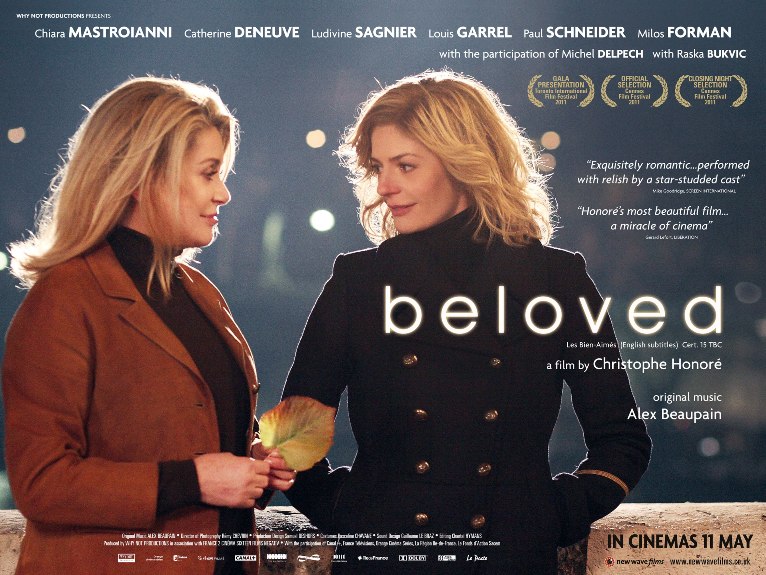Beloved (Les Bien-Aimés)

Set over several generations and approaching the attitudes and relationship between them, director and writer Christophe Honoré latest musical film Beloved is an interesting one for all.
Beloved is rich in style. You will experience the lives of several characters, as time and place change around them, comparing love and relationships in the 60s and the 90s, the moments of ethereal fantasy, obsession, passion and confrontation with life. Surprisingly, these moments do not consistently gel together throughout the film.
Beloved has a huge cast of central characters, some portrayed as younger and older versions of themselves. For example, Ludivine Sagnier plays a younger Catherine Deneuve, as Madeleine. Madeleine is working in a shoe shop when, upon being mistaken for a prostitute, she decides she’d make more money by being one. She then falls in love with a young Jaromil (Rasha Bukvic). Years later, their daughter Véra (Chiara Mastroianni) is also unsuccessful in love, and Beloved follows the lives of this family through out their complicated relationships. Honoré wrote his female characters to be honest and fun, and therefore more likable then the men. The female cast members are wonderful and Mastroianni is magnificent as the sexy and slightly unhinged Véra.
The plot maybe is unrealistic but it is a musical, fleeing into moments of frivolity and fantasy. The musical genre has a history of being an ironic and bittersweet choice with which to present gritty realism, this does cause mild confusion. The film seems to be split into three sections of time, the 60s, 90s, and noughties, through which our central characters exist. However, as far as pace and cohesion are concerned, the film appears as split in two. There is the silly, playful, fun and colourful melodrama, which compliments the whimsical soundtrack in the first half of the film; and following it is the slower, tragic nature of the story’s culmination, within which the soundtrack transforms some beautiful moments of drama into absurdity. It is possible that Honoré could have overlooked this juxtaposition in styles and how the sad songs take something away from the emotion in the sadder scenes. In fact, some musical numbers seem to add very little to the characters, their feelings or the plot, and occasionally drag a scene on for longer than necessary. Whether Honoré had wanted this film to be light-hearted or not, is actually difficult to tell. The film introduces us to such a wide range of elements and stories that towards the end, Beloved starts to come apart.
Beloved is very much a director’s piece. Honoré seemed to have high hopes for the philosophical implication of this film. It is brave, exciting and enjoyable thanks to the philosophical dialogue: refreshing, earnestly quizzical and by no means pretentious. To his credit, Honoré displays a wonderful understanding of space, using the locations to full effect, as the film glides beautifully from scene to scene.
Ultimately, due to the musical nature of this film, it is appealing, interesting and worth seeing but it is a shame that towards the end the power of the subject matter looses gravity and becomes drawn-out. The change in pace does not cope with the musical numbers well, and despite fighting acting performances, a deeply moving and conceptually rich plot splutters to an end. While the final scene tries to place some hope into what has become a film about loss of love and sadness, it is too late. It is a sad Madeleine we are left with, when life started out with such a merry dance.
Sophie-Jeanette Burton
Beloved is released nationwide on 11th May 2012.
Watch the trailer for Beloved here:























Facebook
Twitter
Instagram
YouTube
RSS